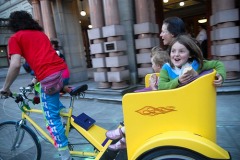
It would sure be fun!
(Photos © J. Maus)
Take a seat and join me on a tour of interesting stories from around the Web. Here’s your Monday Roundup…
In the world of bikes:
- As the rest of the economy falls, bicycle retail is doing just fine, reports an Atlanta newspaper. Stay tuned here at BikePortland for more coverage of the bike economy in the coming weeks.
- San Francisco has released a Draft Environmental Impact Statement outlining the environmental impact of bike lanes, reports the Bay Guardian’s Steven Jones. The 1,353 page document was created after a man sued the city, and won, effectively halting all bike infrastructure improvements for several years until city officials submitted their bike plans for environmental review.
- Portland-based bike builder (and former product designer) Aaron Hayes gets some major attention from one of the web’s best design blogs. Check out this great Q & A with Aaron as part of Coroflot’s Creative Seeds series.
Carfree news:
- After a successful week-long carfree experiment last year, Fazilka, (pop. 64,000), a town in India near the Pakistan border, will permanently ban motorized four-wheel vehicles from its city center during daylight hours. (Take that, Commissioner Leonard!)
- The 2010 Gran Prix in Donington, England is being billed as a “carfree” car race. Event organizers plan to bring all spectators to the event by public transit, and there will be no public car parking at the event.
Trend watch:
- The Sunday Oregonian featured an opinion column by an urban planning student who berates us all, in many ways rightly, for bashing the suburbs rather than proposing solutions for their increasing problems. The suburbs have become an integral part of our country’s cultural fabric, he points out, and we’ll get nowhere without a modicum of respect as we “rethink our relationship with the landscape.”
- A New York Times op-ed about the future of the publishing industry in the wake of Google’s deal to digitalize all the world’s books includes the following quote:
As a technology, the book is like a hammer. That is to say, it is perfect: a tool ideally suited to its task. Hammers can be tweaked and varied but will never go obsolete. Even when builders pound nails by the thousand with pneumatic nail guns, every household needs a hammer. Likewise, the bicycle is alive and well. It was invented in a world without automobiles, and for speed and range it was quickly surpassed by motorcycles and all kinds of powered scooters. But there is nothing quaint about bicycles. They outsell cars.
If you come across something on the web that you think we should now about, tag it with “bikeportland” on delicious.





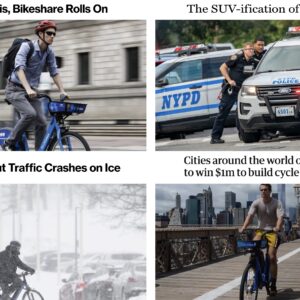
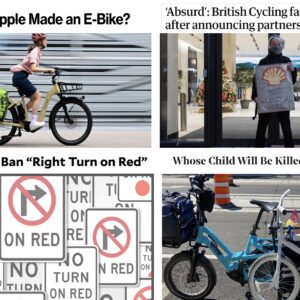
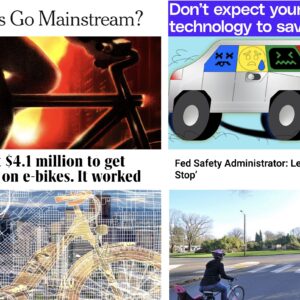
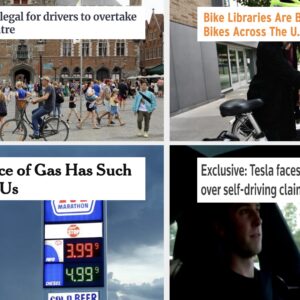
Thanks for reading.
BikePortland has served this community with independent community journalism since 2005. We rely on subscriptions from readers like you to survive. Your financial support is vital in keeping this valuable resource alive and well.
Please subscribe today to strengthen and expand our work.
I would like to take this opportunity to editorialize about the so-called “carfree” Gran Prix race. Is the entry of the carfree idea into the annals of greenwashing an occasion for hope or despair?
On the subject of bicycle retail sales: I was listening to “Marketplace” on NPR recently – the usual doom & gloom about the retail economy, durable goods, and vehicle sales in particular. They like that term – “vehicle sales.” They kept repeating that vehicle sales were way down, blah blah blah. I sent an email reminding them that not all vehicles have 4 wheels and a gasoline engine, and that last I heard, both bicycle and motorcycle sales were up. I never heard back.
mmann #2:
I find myself giving a silent cheer when I hear those stats, though it’s when they refer to car sales specifically. (Good for you pointing out NPR’s fallacy, BTW.) Seems like we’d have to be better off in so many ways if we could disentangle our economy from the non-stop production of autos.
Why is every fifth commercial on prime time for a frickin’ car but the only time bikes get TV ads is during kids cartoons?
Hart: Because the people who run bike shops don’t advertise as much as the people who sell cars do. Maybe because they make less on the sale of a bike than they do on a car, maybe because cyclists are a niche market and aren’t effectively reached by massive spending on television commercials. No more than 10% of Portland commutes by bike, never mind Hillsboro, Beaverton, Gresham, Vancouver etc. Prime time TV ads are much more expensive than off-hours ads, perhaps we’ll start seeing ads during prime time when/if the metro mode split for cycling is up around 25%.
Nice Picture, Jonathan!
The photo is of Sauce, one of the founders of A Better Cycle, (ABC, 23rd and SE Division). He is riding one of Cascadia’s Pedicabs. That particular cab was originally used in the 2000 Sydney Olympics as an advertising medium for Yahoo! and as a way to create a car free olympic village. We would love to help use our cabs to make a car free downtown Portland. Bringing vehicle speeds down to a human level in the downtown core is necessary for livability and accessibility.
News that San Francisco’s Draft Environmental Impact Statement for the San Francisco Bicycle Plan has finally been released is exciting. Bay Guardian writer Steven T. Jones article on this is helpful.
Even more so is his article from back in May (link via the word ‘here’, in article cited above) that discusses how the provision, LOS (Level of Service) is being carefully scrutinized for the way it directs infrastructure design and development.
Just checked Rob Anderson’s (the person heading up those that challenged the plan) District 5 diary weblog. He hasn’t got around yet to commenting on the bike plans environmental impact statement, but I expect he soon will. There’s a good discussion of a related subject going on at his weblog right now.
On the subject of a car free city center, I would love to see this in Portland. In August I went to Madison Wisconsin and enjoyed a car free street they have there called State Street. It’s kind of the heart of downtown, tons of cool little shops and restaurants. It was very enjoyable. Was really refreshing to see a city center that was dominated by bikes and pedestrians.
Having just moved from Wisconsin I have to disagree with State Street portrayal.
It is a single street that runs from the city center to the University of Wisconsin Campus. Hardly representative of the heart of the city and hardly a city center dominated by bikes and pedestrians.
On the subject of suburbs, this transportation seminar at PSU might be interesting:
“Fringe Urbanism: Potential Transportation Patterns In Overlooked Suburban Density”
http://www.cts.pdx.edu/seminars/index.php
From the speaker’s bio:
“I am also interested in alternative patterns of development in Suburbia. There is currently a shift occurring within the peripheries of our cities as social constructs and physical realities collide. The re-development of suburbia holds enormous promise both as an adaptation to changing sociology and in the potential for a more sustainable approach to existing forms of development. Multidisciplinary approaches to architecture and urban design will be critical in how this transformation takes shape.”
There’s no arguing that the suburbs offer people some appealing benefits: quiet, safe places to raise kids, and relatively cheap housing. However, one of my many problems with the ‘burbs is simply from a design perspective, in the way they force people into cars.
Still, I’ve often thought that even existing suburbs could be re-imagined to support more of a car-free existence. It seems like re-zoning could allow for small businesses – simple, practical stores – to be located within the subdivisions, making it that much easier for residents to get food and other necessities without driving.
I daydream about whole little village infrastructures springing up in the midst of these developments. I even thought up a name for them: “subdivillages.” 🙂
so when the sun comes up in Fazilka you just hook up a burro to the yugo and of you go
car free for any City is good 🙂 get around better thats for sure.
RE: “The 2010 Gran Prix in Donington, England is being billed as a “carfree” car race. Event organizers plan to bring all spectators to the event by public transit…”
Perhaps Sam (and the next council member with parks portfolio) can adopt a transit first plan for PIR like what was done for the Civic Stadium PGE Park baseball/ soccer events (ticket price include a MAX/ bus fare).
Afterall the MAX stops right there and the PIR events add a lot of congestion (and air noise pollution) to the I-5 corridor…and Kenton and downtown Vancouver.
I am beginning to really like the monday roundup – great job, Elly!
I think that a carfree downtown is a 40 year dream that is best thought of in 5 year phases. so, bikeportland, where should we start?
imagine, in five years: a pedestrian mall; a reclaimed street (5th, 6th, ankeny) which has evolved from pavement into a parkway.
imagine, in ten years: a downtown area where cars only really go to parking garages to sit!
it seems as if the City has understood the need to open streets to people for special and for reoccuring events. now seems to be the time to press for opening streets to people for good.